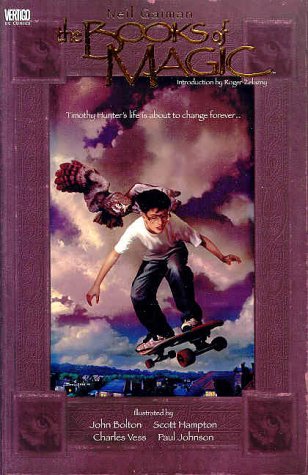On a completely off topic note: I love Halloween. No holiday is better! I hope everyone has a great Halloween.

Neil Gaiman's "The Book of Magic" introduces a new character while calling upon famous magical characters. Timothy Hunter is your average kid (British, but average). Actually, he's a bit whiny and childish, which works well. He is also skeptical and unsure of what he is seeing. He is us, but cooler since he has the possibility to use magic. Of course he knows none of this; if he did I think the story
 would be quite useless. The "Trenchcoat Brigade" is a group of four wise sages sent to keep Timothy on track. They are familiar names in the DC universe: The Phantom Stranger, Doctor Occult, Mister E, and John Constantine (a way cooler comic book character than the movie made him). The Phantom Stranger guides Tim through the magic of the past. Merlin and Jason Blood (a man later bonded to a demon) meet him in their own time. The use of mythical history is brilliantly employed -- from the Big Bang expertly blended with Christianity's fall of Lucifer to the witch trials; Egyptian and Greek mythology are wound together into a cohesive human history. Constantine, snarky and a product of our time, shows Tim current magic.
would be quite useless. The "Trenchcoat Brigade" is a group of four wise sages sent to keep Timothy on track. They are familiar names in the DC universe: The Phantom Stranger, Doctor Occult, Mister E, and John Constantine (a way cooler comic book character than the movie made him). The Phantom Stranger guides Tim through the magic of the past. Merlin and Jason Blood (a man later bonded to a demon) meet him in their own time. The use of mythical history is brilliantly employed -- from the Big Bang expertly blended with Christianity's fall of Lucifer to the witch trials; Egyptian and Greek mythology are wound together into a cohesive human history. Constantine, snarky and a product of our time, shows Tim current magic. The plot begins to pick up a bit, as the importance of Tim is uncovered. His four guardians are described nicely through tarot cards, which help Tim to understand that he "isn't in Kansas anymore." Here current DC magicians make an appearance: Jason Blood, Zatanna, and Tala. For someone entrenched in the DC mythos, this section is great for a different view on the characters. If you aren't all into the DC universe, then this section is just a bit of the story moving along. Doctor Occult takes Tim to Fairyland, where Queen Titania of Shakespeare fame plays a large role. The use of faerie laws is applied, causing Tim to be almost trapped. Finally, Mr. E takes Tim into the future. It is a jumble that connects the entire story through chaos. There is a nice side bit, if you know Gaiman's “Endless.” If not, it isn't too hard to figure out what is going on, for the story concludes its’ end as it began; a nice circle.
It's a great read if you know the DC world, and I think a good read if you don't (Of course I can only guess about that).
I give it a 3 out of 5 stars.
Happy Halloween
J.R. West